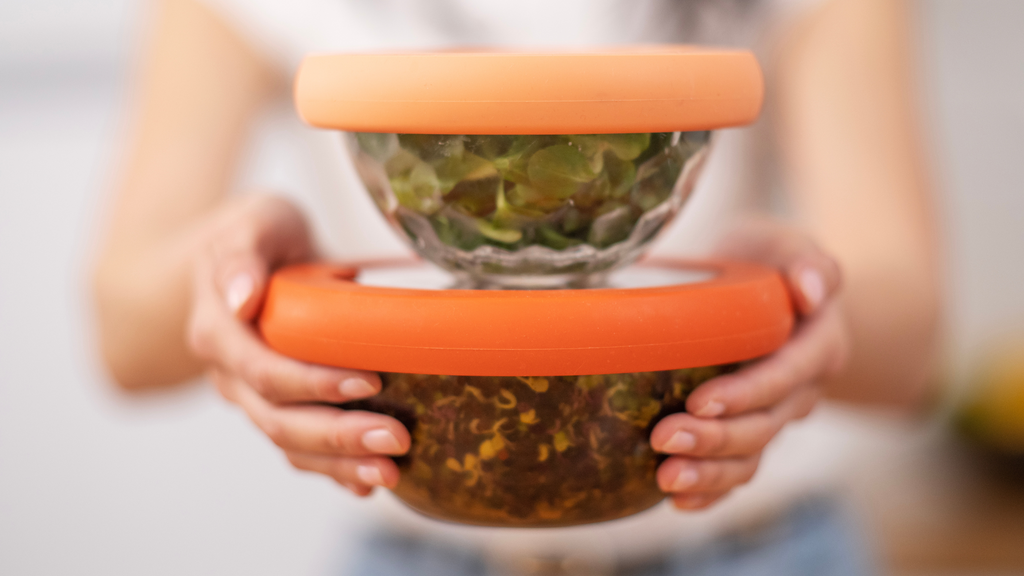
Rrrrrrrrrripppppshhhh!
That sound? It's the obnoxiously loud reminder that there's another sheet of tin foil or aluminum foil likely headed for the landfill, where it'll lay for hundreds of years, never truly degrading.
And aluminum foil's clear and clingy ugly stepsister is no better. Can you recall the suspicious stench of the last piece of plastic wrap you used to cover your leftovers?
Yikes!
Imagine, for a moment, the hundreds of thousands of households, just like yours, using, tearing, and discarding sheets of tin foil and plastic wrap every single day. The mountains of waste accumulating, the toxins slowly seeping, and the environment and our health bearing the brunt of it all.
We've been following in the footsteps of previous generations and we're used to the so-called convenience of products like tin foil - but at what cost?
It's time we found a better way. It's our turn to set the example for future generations with healthy and sustainable ways to live. Luckily, there are plastic wrap and aluminum foil alternatives that we dare to say you'll like even better!
But first, a little backstory to stoke that fire for change:
The Evolution of the Leftover
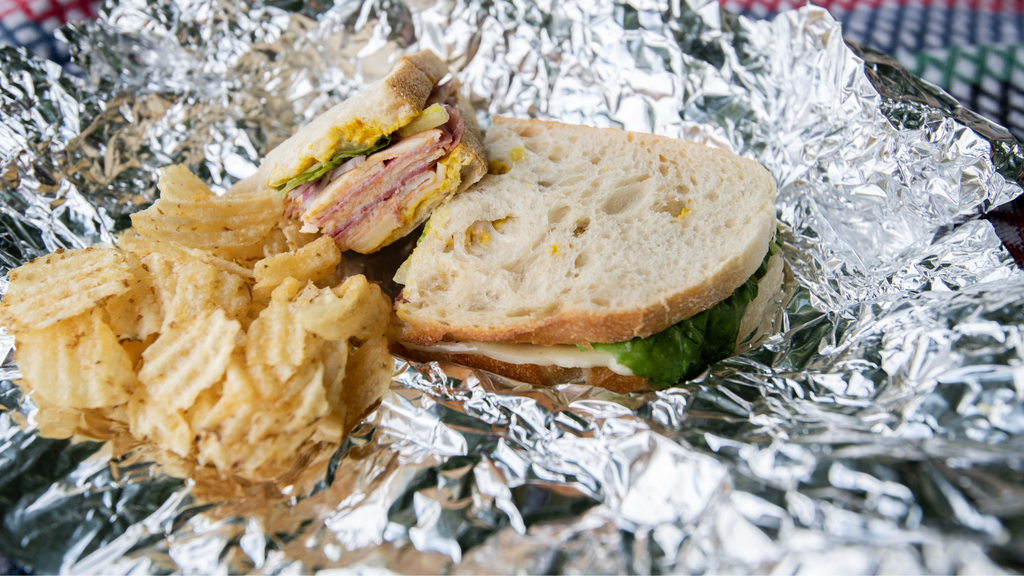
Source: Matthew Moloney/ Unsplash
In the heart of the 20th century, as kitchens buzzed with newfound gadgets and families embraced modern conveniences, two standout solutions emerged for the age-old question:
"How do I cover this leftover?"
Aluminum Foil's Debut:
Lightweight, versatile, and oh-so-shiny, aluminum foil became the go-to for wrapping up just about anything. From half-eaten sandwiches to the remains of Sunday's roast, aluminum foil promised to keep food fresh.
Tin foil's adaptability to both the oven's heat and the fridge's chill made it a favorite among households.
Plastic Wrap Takes the Stage:
Not to be overshadowed, plastic wrap made its entrance just behind tin foil with clarity and cling. This transparent marvel could seal dishes with a tight embrace, making leftovers both airtight and visible.
No more guessing games in the fridge—each dish was on clear display.
The Rise and the Revelations
As aluminum foil and plastic wrap claimed their spots on kitchen shelves, they were celebrated for making food storage effortless. Advertisements championed their convenience, and families across the globe integrated plastic wrap and aluminum foil into daily routines.
But beneath this success story lay questions that would soon bubble to the surface:
Were there unintended consequences to this convenience?
The Flip Side: Unpacking the Environmental and Health Concerns
As aluminum foil and plastic wrap became indispensable in kitchens, not many of us paused to consider their long-term impacts. But as years have turned into decades, it’s become clear that these convenient covers carry with them some weighty concerns.
Ready for this number?
318.97 million Americans used aluminum foil in 2020 and statistics estimate the trend to continue climbing.
Can we be a force of change to turn the trend around?!

Source: Statista.com
The Environmental Toll:
The Aluminum Foil Dilemma
While aluminum foil is recyclable, a significant portion of it ends up in landfills.
Why?
- For aluminum foil to be recycled, it must be clean. Tin foil tainted with food residues or oils is often deemed contaminated. Cleaning this isn't cost-effective for many recycling facilities, and so it gets “tossed”.
- When aluminum foil is discarded with mixed waste, it becomes intertwined with non-recyclable materials. This complicates its extraction and subsequent recycling.
- A general lack of awareness means that many of us toss aluminum foil into the trash without a second thought, assuming it's non-recyclable.
Peeling Back the Manufacturing Curtain
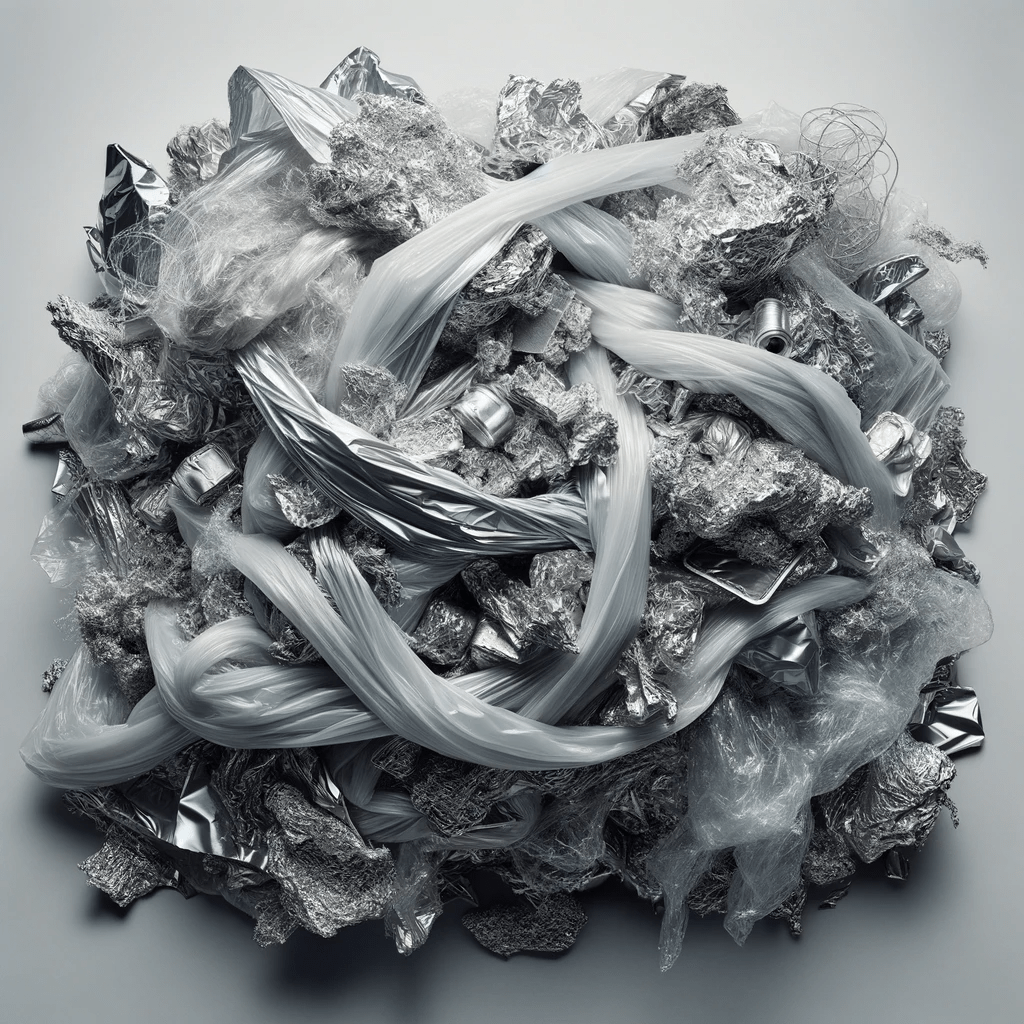
Source: DALL·E 3
Aluminum Foil:
The production of aluminum foil starts with bauxite mining, an activity that leads to deforestation and habitat loss.
The subsequent refining processes are energy-intensive, consuming vast amounts of power and contributing to loads of greenhouse gas emissions.
Every single roll of aluminum foil carries with it a hidden cost to the environment. And that cost is high!
Plastic Wrap:
Originating from petrochemicals, plastic wrap's production is tied to the extraction of fossil fuels—a process that's highly detrimental to the environment.
The refining and processing stages further amplify its carbon footprint.
That box of plastic wrap may represent convenience in many people's eyes, but it's also a chain of environmental compromises.
Health Implications: What's Lurking in Your Leftovers?
Aluminum Foil...
There might be more going on in that tin foil cover than just preserving the freshness of our food.
When aluminum foil comes into contact with certain acidic foods, like tomatoes or citrus fruits, there's potential that the foil will leach aluminum into the food. Consistent exposure and consumption can lead to accumulation in our bodies.
Why is this concerning?
There's ongoing research about the role of accumulated aluminum and its association with neurological conditions like Alzheimer's disease as well as breast cancer.
While the jury is still out on definitive conclusions, it's a factor worth considering in our daily kitchen practices.
Now, Plastic Wrap...
The clear stuff comes with its own set of challenges.
The distinct smell that sometimes wafts from a freshly opened box isn't just characteristic of the material—it hints at the additives and chemicals in its composition.
Some plastic wraps contain chemicals like phthalates or BPA which can potentially leach into our food!
These chemicals have been linked to various health issues, ranging from hormonal imbalances to developmental concerns in children.
What is the Best Plastic Wrap and Aluminum Foil Alternative?
Aluminum foil and plastic wrap have become versatile staples in our kitchens. At Food Huggers, we recognize the environmental and health implications they bring.
Driven by our commitment to sustainability and innovation, we've developed plastic wrap and aluminum foil alternatives that not only prioritize our planet but also enhance your food storage experience.
While other alternatives to aluminum foil and plastic wrap exist on the market, like various glass containers (often with plastic lids), silicone baking mats, beeswax food wraps, parchment paper, cedar wraps and other methods for covering food, we find that food grade silicone food covers are superior for wrapping food and storing food.
Finally! We can say goodbye to short-lived conveniences and happy dance our way to a more sustainable kitchen with fresh and efficient food storage solutions.
Welcome to the Food Huggers revolution!
Discovering Food Huggers: Your Sustainable Kitchen Companions
At Food Huggers, we believe that every kitchen deserves tools that are as environmentally conscious as they are efficient. Let's delve into how each of these products not only replaces aluminum foil or plastic wrap but also enhances your kitchen experience:
1. Flexible Bowl Lids
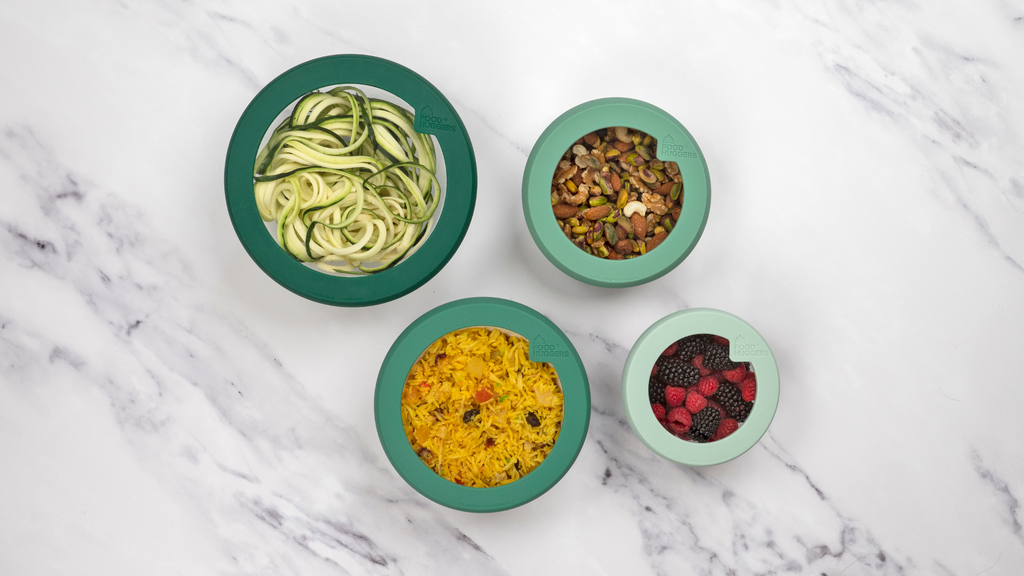
Swap out aluminum foil and cling film for our Reusable Bowl Lids.
Adaptable Fit: Each lid adjusts to fit different bowl sizes, ensuring an airtight seal. This means your leftovers stay fresh longer than they would wrapped in aluminum foil or cling wrap.
You'll reduce food waste, and save money. #Winning
High-Quality Materials: Made with 100% food grade silicone and lead-free, cadmium-free glass. You can be assured of the safety of your food, free from harmful chemicals.
Convenience & Safety: Dishwasher-friendly, stackable, and made with tempered glass - this lets you easily see the contents. No more fumbling through a fridge of stacked bowls with sunken aluminum foil lids. This will be a game changer for your meal prep efficiency and organization!
One of Our Customers Shares:
"The Food Hugger Lids are great for my mixing and cereal size bowls. Great when I have something that I don’t want to transfer to another container. Easy to clean, and the glass lids make them stackable."
A Deeper Dive into Design:
One of the standout features of these silicone lids is the tempered glass center. This isn't just about aesthetics; it's about functionality. By allowing you to see what's inside, you no longer need to lift multiple lids to find that leftover pasta or salad.
Sustainability Aspect:
Think about the number of times you've used aluminum foil or plastic wrap to cover a bowl. Now, consider the environmental cost of that waste. By switching to our reusable silicone lids, you're investing in a product that's designed to last, further minimizing waste in the long run.
2. Hugger Bags
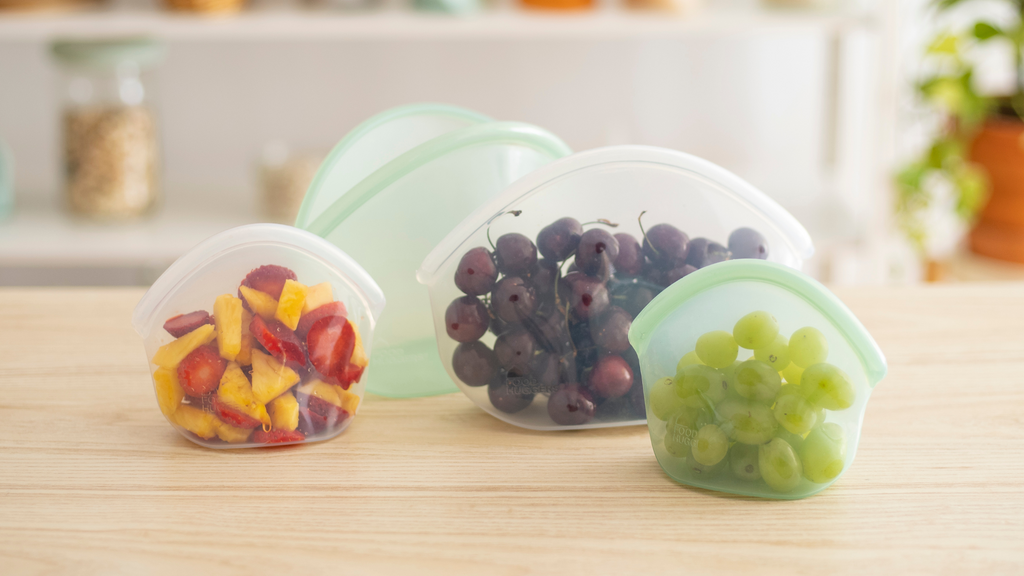
Wave goodbye to single-use plastic baggies with our Hugger Bags!
Versatility: Ideal for storing solid lunch foods and being microwave-safe. It’s a two-in-one solution - store and reheat without transferring containers.
Innovation: Made from platinum food grade silicone, these bags are translucent. You can quickly identify your stored items without having to open multiple bags.
Environmental Impact: By choosing Hugger Bags, you're preventing plastic waste. You contribute actively to reducing the environmental burden, one bag at a time.
Plus, did you know, that Food Huggers has a recycling program? If your bag or Hugger is accidentally damaged beyond usability, you can send it to us to be properly recycled. Read more here!
One of Our Customers Shares:
"I feel so good about using these as an alternative to plastic baggies..."
Beyond Kitchen Uses:
While our Hugger Bags are fantastic for food storage, they're versatile enough for other applications. Going on a trip? They make for excellent toiletry bags. Need to organize your cables and chargers? Use a Hugger Bag. Their see-through nature, combined with their durability, makes them a must-have organizational tool for various aspects of daily life.
The Platinum Difference:
While we've mentioned that our bags use platinum silicone, it's worth diving into why that matters. Platinum silicone is revered for its purity and quality. It doesn't degrade over time like other materials, ensuring that your food isn't exposed to toxins.
3. Food Huggers
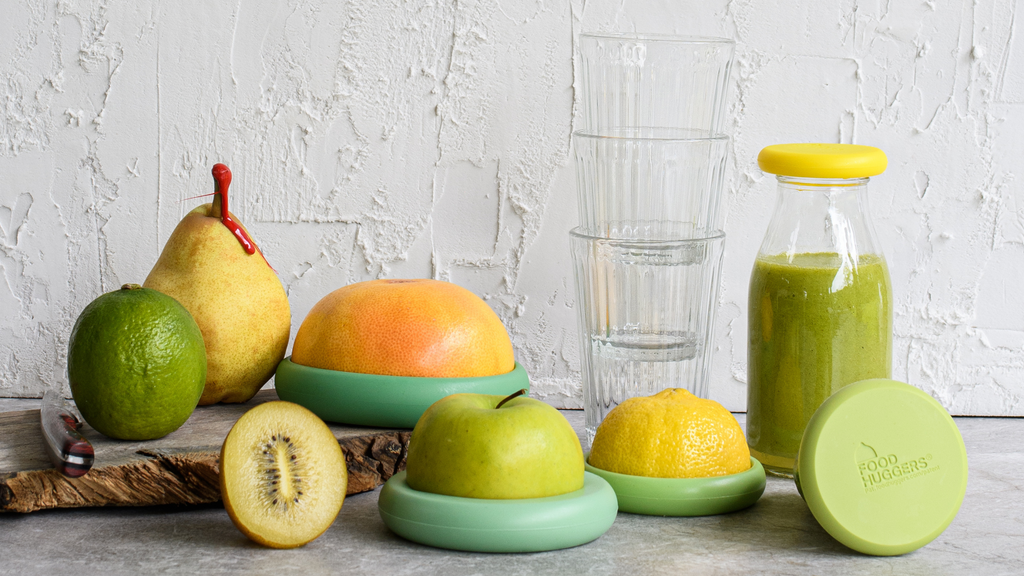
Choose Food Huggers over plastic wraps for a snug, fresh seal on your half-used fruits and veggies.
Easy Application: Simply choose the closest size and place your food piece inside. Your produce remains protected by these cute little silicone food covers without the fuss of tearing or wrapping. Actually, way more convenient!
Wide Range: Designed for everything from bananas to eggplants. One set of Food Huggers caters to a variety of produce sizes, ensuring every piece of produce gets eaten!
Bonus Uses: They aren't just silicone food covers! They can be used as juice glass covers, soap dishes, or even to cap the bottom of your pepper grinder or oil bottle. Beyond food, they provide versatile solutions around your home.
One of Our Customers Shares:
"I love these! I have my own and just gave my mom a set..."
The Art of Preservation:
Fruits and veggies are living things. Even after they're harvested and end up in your kitchen, they continue to respire. By using Food Huggers, you're ensuring that the respiration rate is optimal, reducing the chances of premature rotting. In simpler terms, they help maintain the freshness and nutritional value of your produce, giving you even more time to come up with ways use the other half of that onion!
A Nod to Aesthetics:
Let's face it – a fridge filled with bright, colorful Food Huggers is more visually appealing than one cluttered with plastic wrap and aluminum foil. They add a pop of color to your kitchen, making the mundane act of food storage a lot more joyful.
4. Fabric Bags
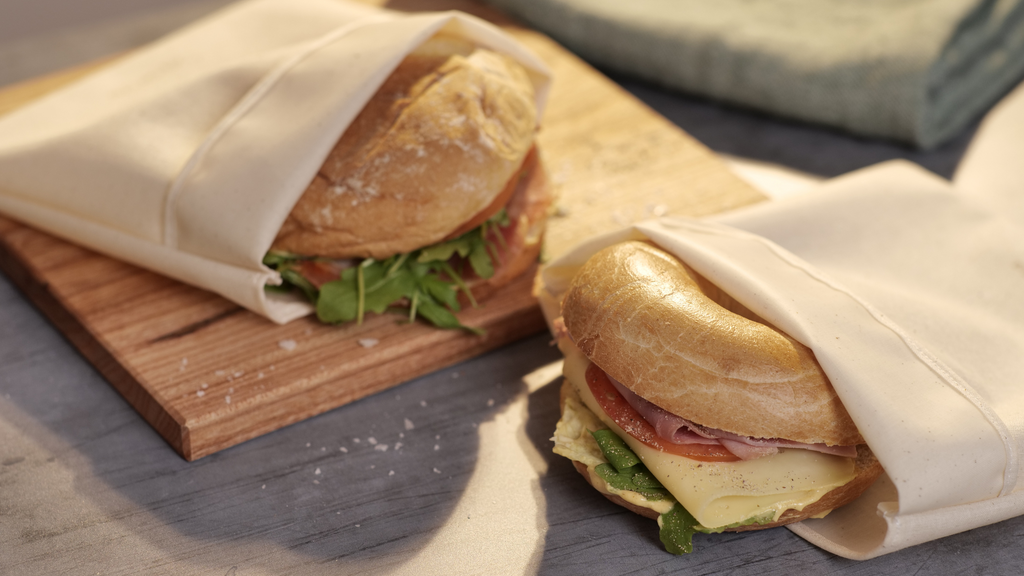
Opt for our Fabric Bags and say goodbye to the infamous sandwich baggie.
Innovative Material: Our unique blend of cotton and silicone ensures durability and safety. These bags are built to last, offering a sustainable and in the long run, a cost-effective alternative to disposable options.
Variety: From sandwiches to bulk items, there’s a design for every need. You have a tailored solution for diverse storage needs, all in one collection.
Care & Usage: Designed to be dishwasher and freezer safe. Hassle-free maintenance and versatile usage make them a staple in modern kitchens.
One of Our Customers Shares:
"This is a really nice sandwich bag...and I like that it helps reduce plastic usage."
A Thoughtful Blend:
The blend of cotton and silicone in our Fabric Bags isn't just for durability; it's a thoughtful choice to ensure breathability. Items like bread, for instance, benefit from a bit of airflow, preventing them from the worst sandwich fate ever - the soggy sandwich.
The Broader Implication:
By opting for reusable Fabric Bags, you're part of a broader movement. A movement that's pushing back against the disposable culture that's become all too common. Every time you use a Fabric Bag, you're making a statement – that sustainability matters, that the environment is worth protecting, and that small choices can lead to significant changes.
Trust us - people will see and they will notice. It's a ripple effect! And you're making waves!
Wrapping Up (Or Should We Say - Putting a Lid on it?)
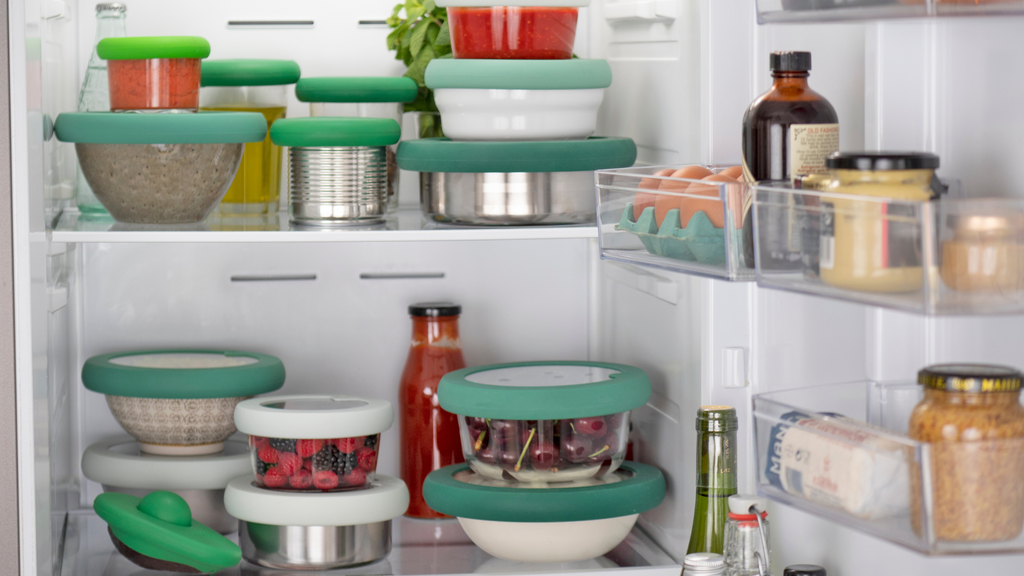
We get it. Old habits die hard, especially when they've been a part of our routines for so long.
The reliance on aluminum foil and plastic wrap is deeply ingrained in many of us, and the idea that they offer convenience is persuasive. Just like adopting reusable grocery bags, opting for a non toxic air fryer, and using a metal straw instead of a plastic one, choosing a healthier and more sustainable option for food storage can have an incredible impact!
And if you've read this far, it means you're open to change - to giving plastic wrap and aluminum foil alternatives a try even when it feels a tad overwhelming. Kudos to you!
Admitting the need for change is often the most challenging part, so give yourself a pat on the back.
You've already taken that crucial first step! Now, it's time for action.
If you have excess wrap or aluminum foil you won't be using, consider donating them to a local food bank. Meanwhile, make space in your kitchen as you embark on this journey of sustainable living, and replace those old rolls of tin foil and plastic wrap with Food Huggers alternatives!
Liked This? Share It on Socials!
Do you have more sustainable kitchen swaps or just want to share your experience with our Food Huggers? We'd love to hear from you.
At Food Huggers, a woman-owned business and Certified B Corp, we highly value your feedback and engagement.
Reach out to us on Facebook, Instagram, and YouTube. It’s where we share our best sustainability tips, exciting new arrivals and exclusive deals.
Meet the Author:
Lauren Eaton is a dedicated mom to her vivacious 16-month-old, Quinn, who fuels her passion for making sustainable choices for a better future. By day, she runs a farm-to-table restaurant, serving nourishing meals to her community. By night, she shares her eco-conscious wisdom on her blog, ByLaurenEaton.com. Whether she's curating local cuisine or blogging about responsible living, Lauren is always inspired to act for the good of her family and the planet.

